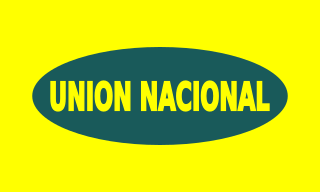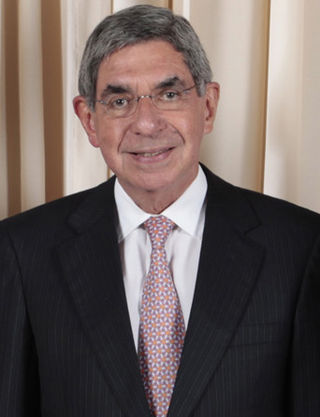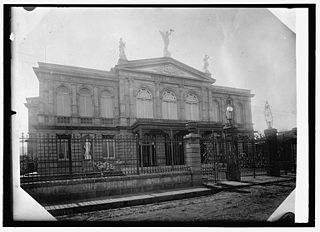
The National Union Party is the name of several parties in Costa Rica, generally located on the centre-right of the political spectrum.

General elections were held in Costa Rica on 7 December 1913, the first direct elections since 1844. They were also the first elections to have universal male suffrage, after economic and educational requirements were eliminated. Máximo Fernández Alvarado of the Republican Party won the presidential election, but both he and runner-up Carlos Durán Cartín later resigned and Alfredo González Flores was appointed president by Congress on 8 May 1914. The Republican Party also won the parliamentary election. Voter turnout was 78.0% in the presidential election and 78.6% in the parliamentary election.

General elections were held in Costa Rica on 2 December 1923. Ricardo Jiménez Oreamuno of the Republican Party won the presidential election, whilst the party also won the parliamentary election, in which they received 51.5% of the vote. Voter turnout was 70.5% in the presidential election and 83.9% in the parliamentary election.

General elections were held in Costa Rica on 26 July 1953, José Figueres Ferrer of the National Liberation Party won the presidential election, whilst his party also won the parliamentary election. Voter turnout was 67.2 percent in the presidential election and 67.5 percent in the parliamentary election. Local elections were also held.

General elections were held in Costa Rica on 2 February 1958. Mario Echandi Jiménez of the National Union Party won the presidential election, whilst the National Liberation Party won the parliamentary election. Voter turnout was 64.7%.

General elections were held in Costa Rica on 6 February 1966. José Joaquín Trejos Fernández of the National Unification Party won the presidential election, whilst the National Liberation Party won the parliamentary election. Voter turnout was 81.4%.

General elections were held in Costa Rica on 2 February 1986. Óscar Arias of the National Liberation Party won the presidential election, whilst his party also won the parliamentary election. Voter turnout was 81.8%.
General elections were held in Costa Rica on 9 July 1882. They were the first after a long line of successive de facto governments following the coup against Aniceto Esquivel Sáenz by his former ally Tomás Guardia Gutiérrez. Vicente Herrera Zeledón, Costa Rica's first conservative president, was placed in Esquivel's place, but in practice he was a puppet of Guardia's authoritarian regime. After the brief presidency of Herrera who resigned using health reasons as excuse, the political elite appoints Guardia to replace him. However Guardia died in 1882 and elections were called, which were won by Freemason and liberal Próspero Fernández Oreamuno member of the Olympus Generation, an elite group of liberal intellectuals nicknamed as such due to their arrogance.
General elections were held in Costa Rica in 1889. Electors for the electoral college were elected on 7 October 1889, who in turn elected the president on 1 December 1889. It was particularly notorious for been the first time in Costa Rica's history that political parties took part in an election. The date of November 7 is still commemorated in Costa Rica as "Democracy's Day" due to the outcome of the liberal government accepting the results of the conservative opposition, as to that point, authoritarian governments were the norm.
General elections were held in Costa Rica in 1894. Voters elected members of the electoral college on 4, 5 and 6 February, who in turn elected the president on 1 April.
General elections were held in Costa Rica in 1897. Voters elected members of the electoral college on 14–16 November, who in turn elected the president on 12 December.
General elections were held in Costa Rica on 1 April 1906. They were held during the presidency of Ascensión Esquivel Ibarra. Ibarra openly supported candidate Cleto González Víquez. Other candidates were former president Bernardo Soto Alfaro, former State and Police Secretary Tobías Zúñiga Castro, the also former State Secretary Máximo Fernández Alvarado and former justice and Foreign Secretary Ezequiel Gutiérrez Iglesias. Difference were more personal than ideological as all candidates except Gutiérrez were liberals, and the election had a strong "anti-cletista" component. This "anti-cletismo" was what united the opposition and talks about a common joint front occurred but it was not applied. Gutiérrez was candidate of the conservative "Democratic Union", the party that emerged from the now outlawed Catholic Union.
The 1910 Costa Rican general election was held during the presidency of Cleto González Víquez. This was the last time that indirect elections were held in Costa Rica as for the next one in 1913 the direct vote was implemented. Liberal lawyer Ricardo Jiménez Oreamuno was elected for the first time. Jiménez was very popular in part because of his struggles against the United Fruit Company's abusive operations in the country. Jiménez was proclaimed candidate in the Teatro Variedades during the first Republican National Convention, Costa Rica's first primary election. Jiménez won easily over the other candidate, former president Rafael Yglesias who ruled an authoritarian, though short-lived, regime.
The Civil Party of Costa Rica was a political grouping that arose in 1893 in sight of the 1894 Costa Rican general election. Initially it acted without a candidate, but later it postulated Navy Secretary of War Rafael Yglesias Castro, who won the electoral vote in the second level election. Subsequently, the party participated in the mid-term election of 1896 for the renewal of half of the Congress, and postulated the re-election of Rafael Yglesias Castro for the 1898 election, in which the opposition refrained from participating. In the 1902 presidential elections it did not nominates any candidate and endorses Ascensión Esquivel Ibarra.
The Partido Agrícola was a political party of Costa Rica. It was founded for the 1923 general election and ran as candidate the wealthy aristocrat and lawyer Alberto Echandi Montero, father of the future president Mario Echandi Jiménez.

Liberalism in Costa Rica is a political philosophy with a long and complex history. Liberals were the hegemonic political group for most of Costa Rica's history especially during the periods of the Free State and the First Republic, however, as the liberal model exhausted itself and new more left-wing reformist movements clashed during the Costa Rican Civil War liberalism was relegated to a secondary role after the Second Costa Rican Republic with the development of Costa Rica's Welfare State and its two-party system controlled by social-democratic and Christian democratic parties.

The Liberal State is the historical period in Costa Rica that occurred approximately between 1870 and 1940. It responded to the hegemonic dominion in the political, ideological and economic aspects of liberal philosophy. It is considered a period of transcendental importance in Costa Rican history, as it's when the consolidation of the National State and its institutions finally takes place.

The Reform State or Reformist State is a period in Costa Rican history characterized by the change in political and economic paradigm switching from the uncontrolled capitalism and laissez faire of the Liberal State into a more economically progressive Welfare State. The period ranges from approximately 1940 starting with the presidency of social reformer Rafael Angel Calderón Guardia and ends around the 1980s with the first neoliberal and Washington Consensus reforms that began after the government of Luis Alberto Monge.

Freemasonry begins in Costa Rica at the same time as in Central America during the course of the 19th century. Regular masonry begins when it was founded by Costa Rican Catholic priest Francisco Calvo, ex-Chaplain General of the Army of Costa Rica during the Filibuster War of 1856, who introduced regular masonry in Central America in 1865. However, there is evidence of the existence of "non-regular" Lodges active after the Independence and before. Prominent Costa Rican figures of politics, literature, art and science, including several presidents of the Republic, were Freemasons.

General elections were held in Costa Rica on 6 February 2022, to elect the president, two vice-presidents, and all 57 deputies of the Legislative Assembly. As none of the presidential nominees obtained at least 40% of the votes, a runoff was held on 3 April 2022, between the top two candidates, José María Figueres and Rodrigo Chaves Robles.










